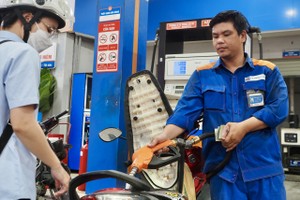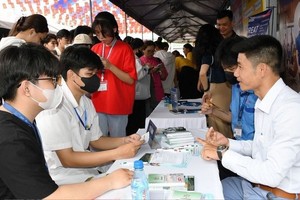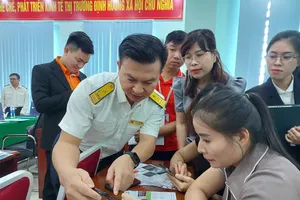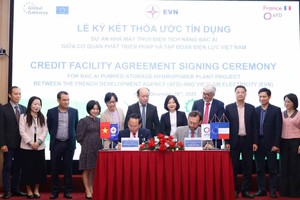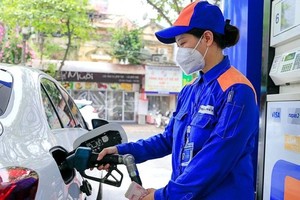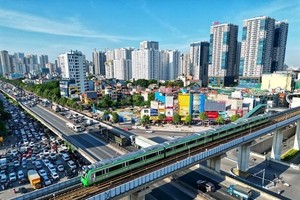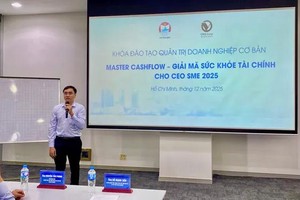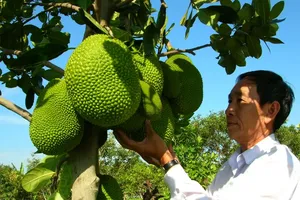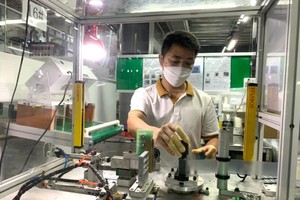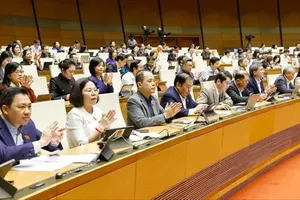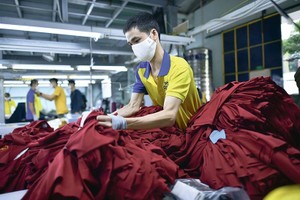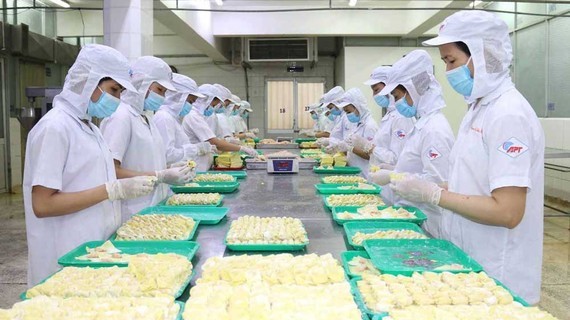 Seafood processing for export at a company. (Photo: SGGP)
Seafood processing for export at a company. (Photo: SGGP)
Many industries post double-digit growth According to the Ministry of Industry and Trade, up to now, Vietnam has been participating in the negotiation and signing of 17 free trade agreements. Of these, three new-generation FTAs are the Comprehensive and Progressive Agreement for Trans-Pacific Partnership (CPTPP), the Vietnam - EU Free Trade Agreement (EVFTA), and the UK-Vietnam Free Trade Agreement (UKVFTA). The implemented FTAs have had a strong impact on economic development as well as on the export of goods of Vietnam. For instance, with the CPTPP, after three years of implementation, export turnover in 2021 increased by 18.1 percent compared to 2020, and in the first ten months of 2022, it rose by 21.1 percent compared to the same period in 2021. Or with the EVFTA, the growth rates are also 14.2 percent and 23.5 percent, respectively. Explaining this result, Ms. To Thi Tuong An, Deputy General Secretary of the Vietnam Association of Seafood Exporters and Producers, said that Vietnamese enterprises were quick and acute when identifying quite well the advantages of each product line suitable for each export market. Specifically, for the seafood industry, enterprises have responded well and met the strict technical standards of many markets, such as the US, Europe, and Japan. The most obvious proof is that the seafood export turnover continuously increased in the Japanese market (33 percent), Canadian market (67 percent), and Mexican market (59 percent) compared to the same period last year. In general, seafood export turnover in ten CPTPP member countries has maintained a double-digit growth rate. For the food processing industry, the CPTPP has also opened up tariff barriers for Vietnamese goods to enter these markets. As a result, the export turnover growth of this industry has also stayed at a double-digit level, despite the adverse developments caused by the Covid-19 pandemic, which broke the logistics chain and increased transportation costs and raw material prices in the past two years.Capital is a vital factor Vietnamese enterprises are inexperienced and weak compared to many international enterprises. Ms. Nguyen Thao Hien, Deputy Director of the European - American Market Department, said that, in the coming time, exporting enterprises would face a series of new technical barriers. For instance, the EU demands increasingly cleaner production processes with less carbon dioxide emissions. By 2026, EU importers will publish the import volume and corresponding gas emissions of the previous year in tandem with the Carbon Border Adjustment Mechanism (CBAM) certificates. To meet this requirement, enterprises must transform in the direction of greening production to meet various standards of each export market because this is the only way if enterprises do not want to be excluded from the common playing field. FTAs create tariff advantages. However, the biggest obstacle for Vietnamese enterprises is the technical barrier. Accordingly, agricultural products entering the US market must have packing factories and growing areas certified by this country. Or, products that want to access the EU market must meet more than 30 technical standards along with social responsibility certification, and the factories must meet ISO and HACCP standards. These standards also change frequently, requiring that businesses must be strong in terms of capital and modern in new technology to be able to turn to respond promptly. In that general context, many business representatives have shared solutions to adapt. According to Mr. Tran Quoc Manh, Chairman of the Board of Directors of Saigon Trading Production Development Joint Stock Company (SADACO), capital is a vital element to businesses today. If the situation of tightening credit room is imposed on all enterprises, then the manufacturing enterprises do not have enough capital to operate as well as innovate the production process. "Currently, many food processing enterprises have had to decline many large export orders because they lack the capital to import raw materials," said a representative of the Food and Foodstuff Association of HCMC. Internally, Vietnamese products have not built a reputation and lack market access opportunities, so they are not able to change the choice habits of world consumers. To overcome this situation, it is necessary to strengthen trade promotion for domestic enterprises to change the view about Vietnamese goods of international consumers. In addition, many businesses believe that it is essential to promote the development of the supporting product manufacturing industry, especially in the field of packaging, printing design, and tray, to help export enterprises not lose orders for not meeting packing standards.
Ms. Nguyen Thao Hien, Deputy Director of the European - American Market Department: Diversifying markets, greening production
To increase export turnover to the FTA market network, enterprises should promote market diversification and enhance products in niche markets. At the same time, they should access new markets through supermarket chains and retail stores in different countries in Europe.
In production, besides proactively controlling and improving product quality, and ensuring strict compliance with EU import standards and regulations, enterprises need to pay special attention to traceability and rules of origin to enjoy incentives from the EVFTA. In addition, it is necessary to research and promote the application of new technology, good practice standards in production, and increase deep processing to increase product value and competitiveness. Efforts to green production, social responsibilities, and environmental protection need to be paid more attention to.
Mr. Jean - Jacques Bouflet, Vice Chairman of EuroCham: Improving the quality of goods to reach the world
Two conditions are required for Vietnamese goods to be exported to the EU to enjoy the advantage of preferential tariffs. First, the goods must meet the required market standards, namely sanitary and phytosanitary measures (SPS) and technical barriers (TBT) related to products. Second, the products must meet the rules of origin. The commodity groups with the highest frequency of being applied with SPS and TBT when imported into the EU are vegetables, processed foods, textiles and garments, leather goods, chemicals, footwear, and plastic products which are Vietnam's main export products.
Vietnamese enterprises need to increase awareness of changes in EU regulations. They must invest in depth and breadth, ensuring strict control of product quality and the entire production process, instead of only overcoming the challenge of SPS and TBT measures at the last stage. Vietnamese enterprises also need to focus on EU standards to design production, processing, and farming processes.
Measures to combat origin fraud should be strengthened. Faking Vietnamese origin and illegal transshipment for export will increase the risk that the EU will apply urgent TBT and SPS measures and trade remedies to Vietnamese goods. The prevention and handling of origin fraud require the participation and cooperation of many ministries and agencies, especially the business community.
To increase export turnover to the FTA market network, enterprises should promote market diversification and enhance products in niche markets. At the same time, they should access new markets through supermarket chains and retail stores in different countries in Europe.
In production, besides proactively controlling and improving product quality, and ensuring strict compliance with EU import standards and regulations, enterprises need to pay special attention to traceability and rules of origin to enjoy incentives from the EVFTA. In addition, it is necessary to research and promote the application of new technology, good practice standards in production, and increase deep processing to increase product value and competitiveness. Efforts to green production, social responsibilities, and environmental protection need to be paid more attention to.
Mr. Jean - Jacques Bouflet, Vice Chairman of EuroCham: Improving the quality of goods to reach the world
Two conditions are required for Vietnamese goods to be exported to the EU to enjoy the advantage of preferential tariffs. First, the goods must meet the required market standards, namely sanitary and phytosanitary measures (SPS) and technical barriers (TBT) related to products. Second, the products must meet the rules of origin. The commodity groups with the highest frequency of being applied with SPS and TBT when imported into the EU are vegetables, processed foods, textiles and garments, leather goods, chemicals, footwear, and plastic products which are Vietnam's main export products.
Vietnamese enterprises need to increase awareness of changes in EU regulations. They must invest in depth and breadth, ensuring strict control of product quality and the entire production process, instead of only overcoming the challenge of SPS and TBT measures at the last stage. Vietnamese enterprises also need to focus on EU standards to design production, processing, and farming processes.
Measures to combat origin fraud should be strengthened. Faking Vietnamese origin and illegal transshipment for export will increase the risk that the EU will apply urgent TBT and SPS measures and trade remedies to Vietnamese goods. The prevention and handling of origin fraud require the participation and cooperation of many ministries and agencies, especially the business community.
